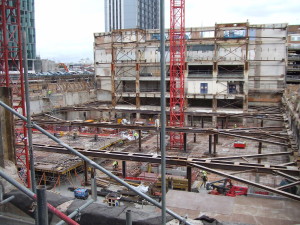Alan Clawley talks about city planning, and the lack thereof.
Birmingham City Council and its friends in the property development business have a well-deserved reputation for sweeping away old buildings, even decent ones that were built a few decades ago; but demolishing a building in Snowhill before it is finished takes their game into an entirely new league.
The unfinished concrete lift shafts of the Snowhill apartment blocks have stood with their steel reinforcement bars exposed to the weather for some years awaiting an upturn in the housing market. For a while they were covered with giant photo-hoardings showing what the buildings would look like when they were finished. Today, the demolition contractors have taken over from the builders and a huge machine is biting chunks out of the concrete. The picture hoardings have been replaced with plain boards advertising the name of the demolition contractor.
The inevitable conclusion must be that nobody wants to buy what was the rage just a few years ago and there is no hope of anybody wanting to do so in the foreseeable future. The developers are calling it a day, cutting their losses, and perhaps re-thinking what to do with the site.
A hundred metres away, what remains of John Madin’s 1966 Post and Mail building – the printing works – has recently been demolished leaving a four-storey hole in the ground. Posters on the hoardings announce that a new car park will be opened on the site in 2014, a scheme no doubt hatched before the City Council announced that it will levy a charge of £300 on every business parking space in the city centre.
The pace of change may be different but the end result – the waste of finite resources – is the same.
The Snowhill case proves that when a building project is conceived it is not possible to entirely predict its future. But most buildings can be adapted to new uses if the original uses are no longer viable. If that were not so, our entire built environment would have been replaced by now. Knocking buildings down has perhaps become too easy a solution now that Birmingham has a sophisticated demolition industry. And developers can hardly be blamed for wanting to make money. Demolition is profitable, adds to the country’s GDP and leads to new construction which is zero-rated for VAT, unlike refurbishment.
That is of course a matter for government .



